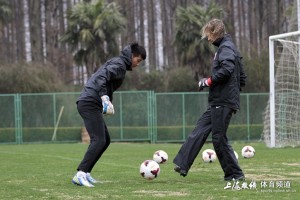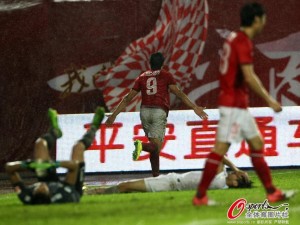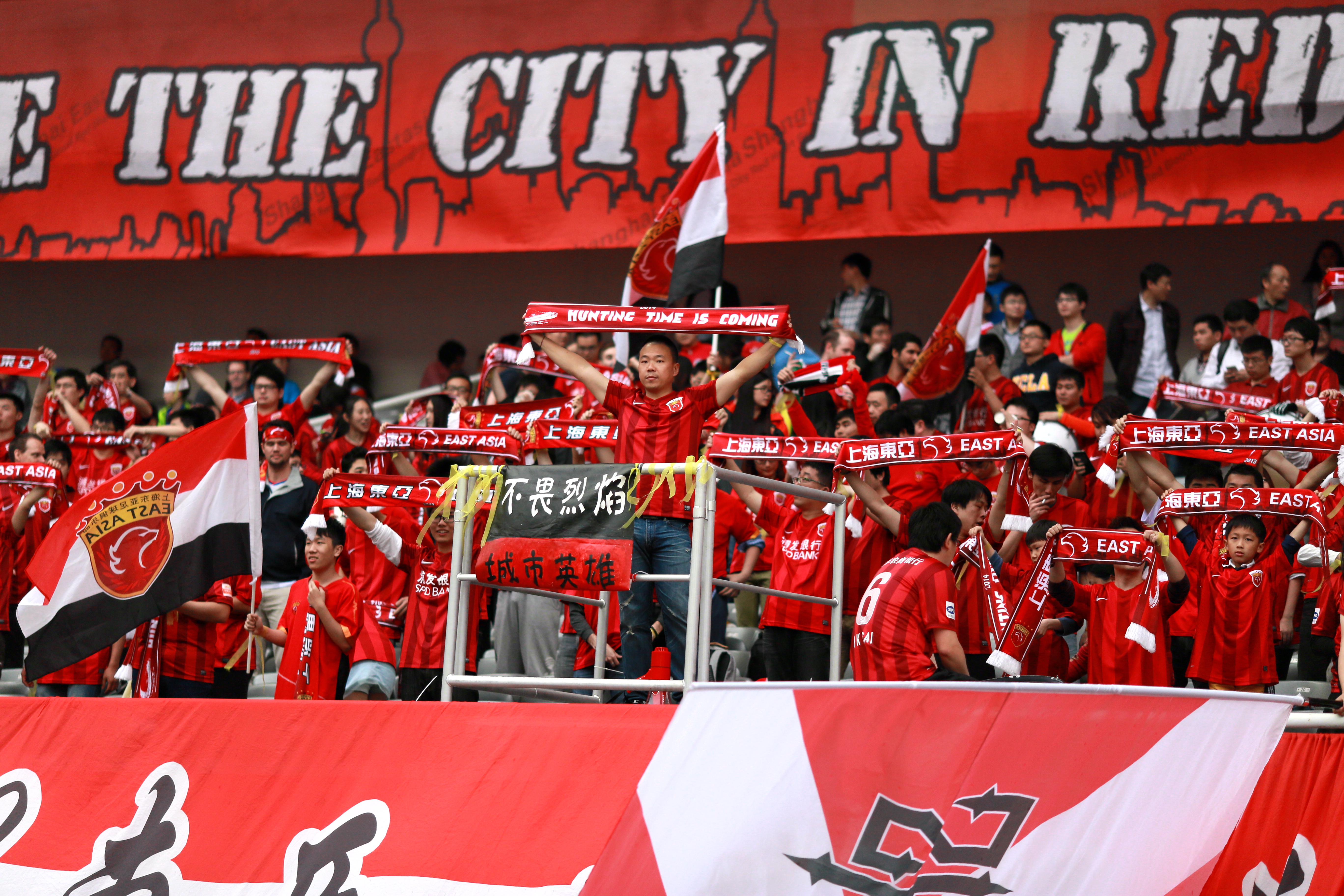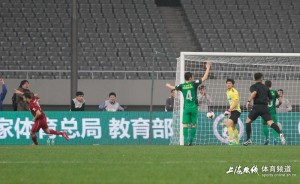In only their second season in top flight football, Shanghai East Asia have gone from mid-table dwellers to potential ACL challengers thanks to the addition of some much needed foreign firepower, a dramatic improvement in the performances of goalkeeper Yan Junling, and an impressive unbeaten home record. Can they maintain this progress throughout the second half of the season and present a genuine challenge for the coveted final Champions League place?
The story so far
Following a solid debut CSL season last year, East Asia have kicked on in 2014, and – at home at least – appear to be genuine contenders for third place and a spot in next season’s Asian Champions League. Average attendances at Shanghai Stadium are up 3,440 on last season, and having witnessed 5 wins and a draw from 6 home games, fans have yet to go home disappointed. Tobias Hysen has shot up to second in the scoring charts, having notched up 11 goals already, while the progress of youngsters Yan Junling and Fu Huan in particular, have given Shanghai supporters much to be pleased with.
Key match
East Asia will undoubtedly look back on March’s 1-0 victory over Beijing Guoan as perhaps the biggest moment of their 2014 season so far. Having gone down 4-0 in Beijing and 3-0 on their own turf to the capital city side last season, Shanghai put in a resolute display against the title challengers and Tobias Hysen’s (admittedly offside) goal was all that separated the two sides. Despite following this up with a limp 1-0 defeat at Henan Jianye, the Beijing victory sent a message out to the rest of the CSL that Shanghai Stadium would not be an easy place to visit this term. Shanghai’s run of 6 home games unbeaten (with only one draw) has affirmed this missive, and five-goal displays against poor opposition such as Shanghai Shenxin and Guizhou Renhe have shown the potential of East Asia’s attack to really put teams to the sword.
Stars
A firm contender for signing of the season, Tobias Hysen has undoubtedly been the star man for Shanghai East Asia so far this year. Having emphatically taken over goalscoring duties from the injury-hit Wu Lei, the Swede has found the net 11 times in the 13 games he has played so far. Furthermore, his much-developed understanding with strike partner Daniel McBreen in recent weeks, has given greater cause for optimism going into the second half of the season.

Yan Junling’s goalkeeping displays have shown vast improvements thanks to the efforts of coach Ian Walker.
At the other end, Yan Junling has been a revelation between the sticks for East Asia, with match-winning performances against Changchun and Harbin amongst the highlights of a highly impressive 2014 CSL campaign. In mentioning Yan’s fine form, it would certainly be remiss not to highlight the impact goalkeeping coach Ian Walker has had on the young ‘keeper’s displays. Yan has spoken several times of the improvements he has made under Walker’s guidance, and his recent involvement in the national set-up demonstrates just how far the 23 year old has come in the short time working with his new mentor.
Flops
It’s maybe harsh to label Wu Lei a flop this year, but fans have certainly been left thoroughly disappointed by the lack of impact that their star player has made so far – struggling for form and fitness across a frustrating opening 14 games. After the same number of fixtures last year, Wu was well on his way to becoming 2013’s top homegrown goalscorer, having already found the net 9 times. However, this term, having scored in each of the first three games, Wu has been dogged by a recurring knee injury, which has limited his impact and seen the goals dry up in the fixtures since. Every person associated with the club will be desperately hoping the summer break gives their number 7 the time he needs to return to full fitness.
Must improve

April’s 5-0 defeat at leaders Guangzhou Evergrande hammered home the need for defensive reinforcements.
However much attacking potential East Asia may possess, they must also improve defensively if they are to maintain a challenge on the teams at the top of the table. Despite sitting behind only the two Guangzhou sides in the goalscoring charts, Shanghai have conceded as many as the likes of Shanghai Shenxin and Tianjin TEDA, and find themselves joint 5th in the number of goals conceded. Centre backs Ransford Addo and Ibán Cuadrado have looked reasonably assured at home this year – Addo in particular, with some gut-busting last-ditch challenges, has impressed – but it is on the road that East Asia’s defensive frailties really show; having conceded 15 goals in 8 games. Cai Huikang has performed well in the heart of midfield, but his side still have a tendency to get overrun in the middle of the park, and surrender too much possession in front of their back four. With a free foreign player slot remaining, some experienced support in defensive midfield would be a welcome addition to the squad in the summer transfer window.
Wildcard
The fixture list could be key to East Asia sustaining a push for third place, as of their 7 remaining away games, only Beijing and the Shanghai derby at neighbours Shenhua – on paper at least – present what could be considered serious challenges. Conversely, this also means that East Asia will see both Guangzhou teams, as well as Shandong and Jiangsu, visit Shanghai Stadium, and with such an impressive track record in front of their own fans, might fancy their chances against their top of the table rivals.
Outlook
Much will depend on the ability of Wu Lei to successfully shake off the knee injury that has so visibly hampered his performances of late. If he can recapture the form of last season, adding more goals to an already potent East Asia attack, and Xu Genbao can further strengthen the squad – as he has suggested may be possible – with some quality defensive-minded reinforcements, then Shanghai will certainly be well-equipped for an assault on third place come the end of the season.


Great 1st half and great WEF coverage of Dongya!